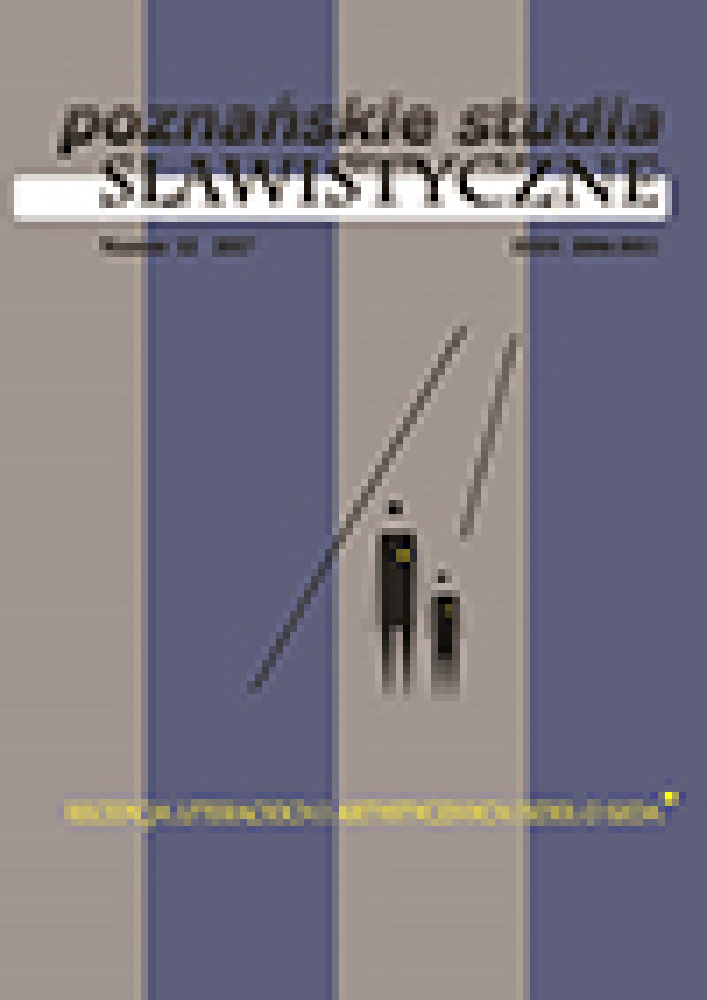Abstract
The article presents three strategies elaborated in the seventies of the last century by the postmodern prose, in order to tell us about the genocide. To name these strategies, the authoress makes use of the terms of blurring, patch, and “sous rapture”, which serve discussing Double or Nothing by Raymond Federman, W, or the Memory of the Childhood by Georges Perec, and Cigi de Montbazon by Anatol Ulman. The essential part in the discussion on the genocide is the reception of the above mentioned novels reconstructed among others on the base of works by Susan Rubin Suleiman along with her conception of the “1.5 generation”. The article also aims at a presentation of the interference between Cigi de Montbazon and European postmodernism exposed in Brian McHaleʼs idea of “worlds under erasure”. It is worth adding that the indicated presentation has not been yet considered.References
Birenbaum H., 2012, Nadzieja umiera ostatnia, Oświęcim.
Blanchot M., 1996, Wokół Kafki, przeł. K. Kocjan, Warszawa.
Cuber M., 2013, Metonimie Zagłady. O polskiej prozie lat 1987–2012, Katowice.
Federman R., 1983, Surfikcja – cztery propozycje w formie wstępu, w: Nowa proza amerykańska. Szkice krytyczne, wyb., oprac. i wstępem opatrzył Z. Lewicki, przeł. J. Anders, G. Cendrowska, A. Kołyszko et al., Warszawa.
Federman R., 1984, Głos w szafie, przeł. M. Wilczyński, „Literatura na Świecie” nr 9 (158), s. 194–214.
Federman R., 1989, The Voice in the Closet, Hamburg [b.n.s.].
Federman R., 2002, Uśmiechy na placu Waszyngtona. (Poniekąd romans), przeł. K. Walewski, Lublin.
Federman R., 2010, Podwójna wygrana jak nic. Prawdziwy fikcyjny dyskurs, przeł. J. Kutnik, Kraków.
Hutcheon H., 1991, A Poetics of Postmodernism: History, theory, fiction, London–New York.
Kłosiński K., 2000, Eros, dekonstrukcja, polityka, Katowice.
Kutnik J., 2010, Tłumacz po słowie, w: R. Federman, Podwójna wygrana jak nic. Prawdziwy fikcyjny dyskurs, Kraków.
Lacan J., 1977, Desire and the interpretation of desire in Hamlet, „Yale French Studies” nr 55–56, s. 11–52.
https://doi.org/10.2307/2930434
Lejeune P., 1991, La memoire et l’oblique: Georges Perec autobiographe, Paris.
McHale B., 2012, Powieść postmodernistyczna, przeł. M. Płaza, Kraków.
Michaels A., 1996, Fugitive Pieces, Toronto.
Perec G., 2014, W albo wspomnienie z dzieciństwa, przeł. W. Brzozowski, Kraków.
Sebald W.G., 2001, Austerlitz, London. Spivak G.C., 1997, Acknowledgments, w: J. Derrida, Of Grammatology, Baltimore.
Suleiman S.R., 2008, Crises of Memory and the Second World War, Cambridge–Massachusetts–London.
Suleiman S.R., 2011, When postmodern play meets survivor testimony, w: Federman’s Fictions. Innovation, Theory, and the Holocaust, red. J.R. Di Leo, New York.
Ulman A., 2001, Cigi de Montbazon, Koszalin.
Uniłowski K., 1998, Opowieść znaleziona na śmietniku (Cigi de Montbazon Anatola Ulmana), „Twórczość” nr 6, s. 50–58.
Uniłowski K., 2001, Wstęp, w: A. Ulman, Cigi de Montbazon, Koszalin.
Vice S., 2004, Children Writing the Holocaust, New York.
https://doi.org/10.1057/9780230505896
Ziomek J., 2000, Retoryka opisowa, Wrocław.
License
Copyright (c) 2017 Marta Tomczok

This work is licensed under a Creative Commons Attribution-NoDerivatives 4.0 International License.
